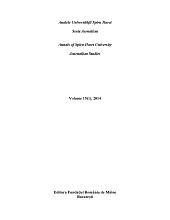FAMILY CLIMATE VERSUS THE CLIMATE OF INSTITUTIONS
FAMILY CLIMATE VERSUS THE CLIMATE OF INSTITUTIONS
Author(s): LAURA GORANSubject(s): Media studies
Published by: Editura Fundaţiei România de Mâine
Keywords: family; climate; institution; environment; education; behavior
Summary/Abstract: This paper shows the benefits of family environment for the child in relation to the institutional climate. The family is considered as the main factor of child education and it is represented as a system in which the mother is shaping the formation of the child’s emotional side. Considering Gueux’s research, the author of this article states that institutionalized adolescents contracted the maternal deficiency syndrome, which is manifested by anorexia (food refusal), and negativism in communication. Also, considering the work of other researchers, this article will show that young people in institutions face multiple psychological and biological issues and form some negative patterns of behavior such as: excessive introversion, anxiety, chronic visual deficit (fear of being looked at and to look at the other), aggressive behavior. Other problems caused by lack of attachment are: indiscriminate affection – the socalled super-competent child, lack of self-awareness, control difficulties syndrome, “2 or 20” syndrome, delays in the development of consciousness. The author of this article mentions the four basic needs of the child described by Kellmer-Pringle (need for love and security, exploring, praise and recognition, responsibility and personal independence) and reviews the theories about the “single most important need.” Then the author mentions the solutions to ensure these needs in institutionalized children, namely: the professionalism of teachers and personnel selection on the criterion of humanity, an individual plan of institutionalized care, based on future socio-professional integration, and the existence of a specialized service to help young people after leaving the institution.
Journal: Analele Universităţii Spiru Haret. Seria Jurnalism
- Issue Year: 15/2014
- Issue No: 1
- Page Range: 05-11
- Page Count: 7
- Language: English
- Content File-PDF

